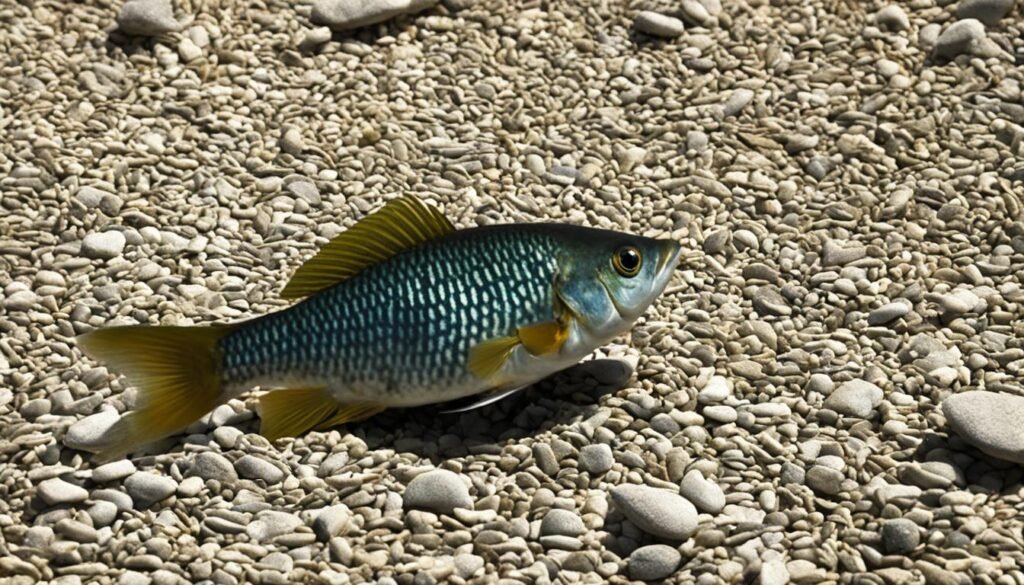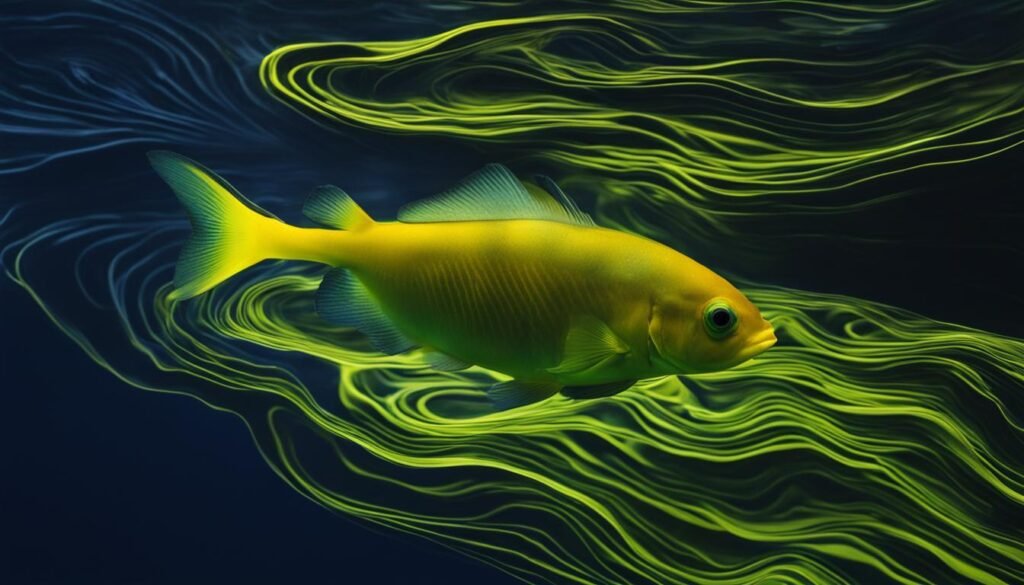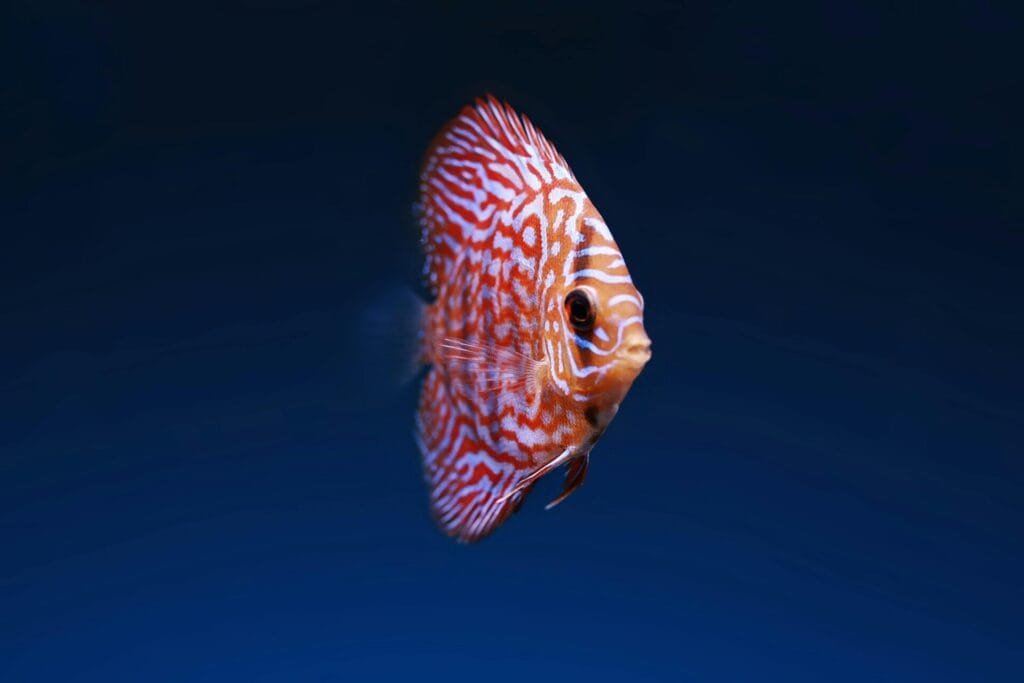Have you ever wondered how long a fish can survive out of water? Fish are fascinating creatures with unique adaptations for life underwater. In this article, we will explore the intricacies of fish survival, focusing on their respiration process and biology.
When it comes to breathing, fish rely on their gills to extract oxygen from the water. But what happens when they are out of their natural habitat? How long can a fish survive without access to water?
The answer to this question depends on various factors such as the species of fish and their size. While most fish do not have the necessary adaptations to breathe oxygen from the air, some can survive for a short period outside of water.
It’s important to note that freshwater fish generally have the shortest survival time out of water. For example, pet fish like goldfish can survive for up to one hour outside of water. Smaller aquarium fish, such as neon tetras and guppies, have a much shorter survival time of about ten minutes.
However, there are some exceptions. Certain amphibious fish, like mudskippers and lungfish, have adaptations that enable them to breathe oxygen from the air, allowing them to survive for longer periods outside of water.
Large ocean fish, like whale sharks, also have a better chance of surviving outside of water due to their larger body size. They can endure for several hours outside of water, although they still have their limits.
Understanding how fish survive out of water is crucial for their well-being. It’s important to minimize the time fish spend outside of their natural habitat and ensure that they do not suffocate or experience unnecessary stress or pain.
In the following sections, we will delve deeper into the factors that affect fish survival out of water, the specific survival time of different fish species, and the intriguing abilities of certain ocean fish and the walking catfish.
Factors Affecting Fish Survival Out of Water
Several factors influence a fish’s ability to survive out of water. Understanding these factors can shed light on the adaptations and behaviors that enable some fish to survive longer in non-aquatic environments.
The Power of Adaptation
One of the main factors that determine a fish’s survival out of water is its adaptation to different breathing mechanisms. While most fish rely on their gills to extract oxygen from the water, some species have developed unique adaptations for respiration.
- Gill Modifications: Certain fish species have specialized gills that can extract oxygen from the air for short periods. These modified gills enable them to respire both underwater and in humid environments above water, such as mudskippers and lungfish.
- Respiratory Organs: Fish species like the betta fish possess a labyrinth organ that allows them to breathe atmospheric air. This adaptation enables them to survive longer outside of water compared to fish without this organ.
Size Matters
The size of the fish also plays a crucial role in its ability to survive out of water. Larger fish generally have a higher body mass, which allows them to store more oxygen. This increased oxygen supply can sustain their vital functions for a longer period than smaller fish.
Environmental Conditions
The environmental conditions directly impact a fish’s survival time outside of water. Moisture levels in the gills are particularly critical. When the gills dry out, the fish’s ability to extract oxygen from the air is compromised, reducing its survival time. Additionally, temperature and humidity levels also influence a fish’s physiological processes and overall well-being.
Impact of Fish Behavior
The behavior of a fish when it’s out of water can have a significant impact on its survival. Stress and panic can accelerate the decline of a fish’s health, leading to a shorter survival time. Fish that remain calm and conserve their energy have a better chance of enduring extended periods outside of water.
Understanding the combination of these factors is crucial in predicting and managing fish survival out of water. By considering the species, size, adaptations, and behavior of fish, strategies can be developed to reduce stress and minimize the time fish spend in non-aquatic environments.
Survival Time of Different Fish Species Out of Water
The survival time of a fish out of water varies depending on its species. Different fish species have different adaptations that determine their ability to survive outside of water. Let’s explore the out-of-water survival times of various fish species:
Freshwater Fish:
Freshwater fish, such as goldfish, typically have a shorter survival time compared to other fish species. They can survive out of water for a few minutes to one hour. It’s important to note that goldfish are not equipped to survive for prolonged periods without water, so it’s best to return them to their aquatic environment as soon as possible.
Saltwater Fish:
Saltwater fish have a slightly longer out-of-water survival time compared to freshwater fish. They can survive for up to 20 minutes outside of water. However, like freshwater fish, their survival is limited, and it’s essential to minimize the time they spend out of water to prevent suffocation and distress.
Amphibious Fish:
Some fish species, such as mudskippers and lungfish, have developed unique adaptations that allow them to live outside of water for extended periods. These amphibious fish have the ability to breathe through their skin or specialized structures, such as lungs. As a result, their survival times can range from a few days to several weeks, depending on the species and environmental conditions.
Aquarium Fish:
Certain aquarium fish, like betta fish, possess a specialized organ called the labyrinth organ. This organ enables them to extract oxygen from the air and survive in oxygen-depleted environments. Betta fish, for example, can breathe atmospheric air and survive outside of water for longer periods compared to other fish species. However, even fish with this adaptation have their limits and should not be kept out of water for prolonged periods.
It’s crucial to remember that while some fish species can tolerate being out of water for longer, it’s always best to keep them in their appropriate aquatic habitats to ensure their well-being and minimize stress.
Survival Time of Large Ocean Fish and Walking Catfish
While most fish have limited survival time out of water, some large ocean fish and certain species, like the walking catfish, have developed adaptations that allow them to survive for longer periods.
Large ocean fish, such as blue whales, can stay out of water for a few hours, primarily due to their larger body size. However, most large ocean fish, like whale sharks, can only survive for up to 30 minutes to an hour.
The walking catfish, on the other hand, is known for its ability to survive outside of water for up to 18 hours. These fish have an additional organ that allows their gills to absorb oxygen from the air, and they can even travel long distances across land. However, they are considered invasive species due to their ability to establish new habitats without human intervention.
| Fish | Survival Time Out of Water |
|---|---|
| Blue whale | Few hours |
| Whale shark | 30 minutes to 1 hour |
| Walking catfish | Up to 18 hours |
Conclusion
In conclusion, the ability of fish to survive out of water is largely limited by their reliance on gills for respiration. Fish species and size play a crucial role in determining their survival time. Freshwater fish generally have the shortest survival time, while amphibious fish, saltwater fish, and certain aquarium fish are better equipped to withstand longer periods outside of water.
Environmental conditions, such as moisture levels and temperature, greatly influence a fish’s ability to survive out of water. Additionally, fish behavior and adaptations for breathing also impact their survival rates. It is essential to minimize the time fish spend out of water to ensure their well-being and prevent suffocation.
Understanding the biology and respiration mechanisms of fish is crucial for their conservation and welfare. As aquatic animals, fish have developed specialized adaptations that enable them to extract oxygen from the water. However, this reliance on gills makes them vulnerable in terrestrial environments.
To promote the survival and health of fish, it is important for individuals to be aware of their specific needs and limitations. Providing a suitable habitat with proper water conditions and minimizing stressors can greatly enhance the survival chances of fish. By respecting and protecting these amazing creatures, we can contribute to their continued well-being and the preservation of their remarkable ecosystems.


